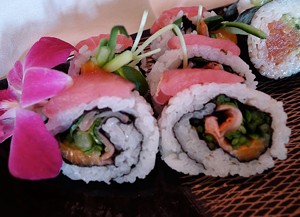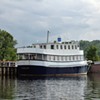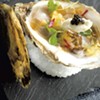Published July 3, 2012 at 4:24 p.m.
Frank Richardi swirled cream sauce in a sauté pan and waited for the diners he knew were on their way. A few moments later, after they had finished crunching through local chicken taquitos and sipping limonata at Habanero’s Mexican Grille down the block, a small crowd spilled into Richardi’s Lago Trattoria to sample his sweet-potato ravioli.
The group consisted of a few reporters, local officials and even a tiara-wearing Miss Vermont. With a splash of Lincoln Peak Vineyard’s Starlight Rosé in our glasses, we tucked into quarter-portions of the flat, floppy ravioli in a pool of peppery cream sauce, their filling a mélange of soft local cheeses. Soon each plate was wiped clean with a slab of crusty garlic bread. I immediately wanted more.
Whetting the palate was the aim of Taste of Newport, the annual, 2-year-old walking tour of city eateries. On this steamy June night, more than 100 people noshed their way through locally sourced fare, washing it down with local beers and wines at each stop. At Lago, the sweet potatoes inside the ravioli were locally grown, the pasta was made from King Arthur Flour, the cheeses and cream were from Cabot and Butterworks Farm, and Northeast Kingdom Garlic harvested the garlic.
“We weren’t necessarily raised with restaurants that were thinking about local,” observes Jen Butson, who grew up in the Northeast Kingdom and works with the Vermont Department of Tourism and Marketing. She’s also a longtime vegetarian. “Now I can come to places like Newport and know I can have world-class food,” she says.
That we had eight places to visit was a testament to Newport’s ascendancy as a food-loving town. In the last two years alone, the city has gained four new restaurants, including the upscale tapas restaurant Le Belvedere. In a few months, West Glover’s Parker Pie Company will open a second location at the expanding Newport Airport, a new biotech firm will open in town and work will begin on a lakeside conference center.
Richardi has been a leader in this foodie movement. In 2001, he and his wife, Michelle, headed north from Massachusetts to open Lago Trattoria at the corner of Main and Coventry streets. The former railroad city was still in the doldrums: Manufacturing had floundered since the 1960s, and layoffs at Vermont Teddy Bear Company had worsened the decline. Despite Newport’s assets — including a stunning shoreline along Lake Memphremagog — rising unemployment, crime and poverty threatened to render the city a northern purgatory.
That didn’t daunt the Richardis, who had scouted around New England for a place to open a restaurant and enjoy the outdoors. They found the Kingdom to be “one of the most beautiful places in New England, if not the most beautiful,” Frank Richardi says.
Though stately buildings were in good supply in Newport, fine dining wasn’t. “We were pioneers,” Richardi concedes. “We looked at Newport and thought, In 20 years, this place is really going to take off. It was one of the last areas of New England that hadn’t been overbuilt.”
In their new resto, the couple began dishing out ravioli, grilling thin-crust pizzas and stuffing pork chops with Gorgonzola cheese, and they slowly but steadily built a clientele. The Northeast Kingdom’s food revolution was barely a stirring at that point, but still, Richardi strove to source local foods, including tomatoes and basil from his own garden.
It wasn’t until six years later that Newport scored a Vermont Downtown designation and formed the Newport City Renaissance Corporation, a nonprofit aimed at giving the place a shot in the arm. “We knew we had this wonderful waterfront, that where we were situated in Vermont is very special, and that the people who live and work and play here are genuine people,” says NCRC director Patricia Sears. Soon the city was landing grants, and it attracted the attention of the American Institute of Architects; in 2009, that group chose Newport as the first Regional/Urban Design Assistance Team location in Vermont. A national team of architects visited the city and met with residents to come up with urban planning suggestions; the AIA calls it a “historic event” that could change the face of Newport.
Native son Paul Dreher — also an architect, and the city’s zoning administrator — recalls the Newport of the 1980s as vibrant. But, after years of layoffs, downtown stores began to “close at a steady clip. It sort of bottomed out,” he says. Dreher left to attend university and then work with an architecture firm in New York City, but he returned to Newport a year before it became an R/UDAT city — and was thrilled by the news. “Holy smokes, that’s a really rare thing!” he remembers thinking of the architectural honor. “It’s like the queen coming to your town.”
If Newport had been parched for innovation, “the group that came in from the American Institute of Architects was like splashing cold water on us,” says Sears of the group’s recommendations, which were woven into a visionary new planning code for Newport. “They reminded us to look at what our assets are — looking out the window to the lake, looking down the street at our restaurants, looking to all of the people who turned out over those five days [of the initial visit].”
One key asset was food. “Food is critical for two reasons,” says Dreher. “One, because of the national trend toward the importance of food and food systems. And our objective was also to combat food insecurity.”
Dreher and others collaborated to transform an empty parking lot surrounded by rentals into a community garden planted with tomatoes, peppers, lettuce, strawberries and greens; some of this produce was sold to local restaurants. The garden is also the setting for workshops on food preservation and preparation, and a nexus for neighborhood gatherings.
At the NCRC, Sears cofounded Fresh by Nature, a sort of mini-Vermont Fresh Network, to help publicize the city’s edible assets and connect farmers with restaurateurs, consumers and tourists.
Many community leaders have joined forces behind the Northeast Kingdom Tasting Center, a three-story food mecca planned for construction inside a former department store on Main Street. Among those involved are Eleanor and Albert Leger of West Charleston’s Eden Ice Cider, who hope to make their business the center’s anchor tenant.
“[The building] has 8000 square feet on the lower level, which is a wonderful place to have a winery,” Eleanor Leger says. “It would give us this great production space, and a presence on Main Street to promote who we are and what we do. Right now, we’re a mile up a dirt road.”
Sears says the vision for the center also includes a cheese monger, meat and seafood counters and a bistro. “It’s definitely going to be a hub,” she says.
Steve Brault, who purchased Newport Natural Market and Café two years ago, is also part of the effort. Brault moved to the area a few years back from New Jersey. “I had no idea I was going to end up owning a natural-food store,” he says. But when he did, Brault “kicked it up a notch”; he rehabbed the façade, added a juice machine, expanded the market’s hours and laced the menu with local produce from Pete’s Greens, Westfield’s Berry Creek Farm and Butterworks Farm, among others.
During the Taste of Newport, Brault served up fresh greens from Berry Creek and sprouts from Albany’s Peace of Earth Farm dressed with local maple vinaigrette, and doled out bowls of hearty bison chili with beefalo from Spring Hill Angus. “Newport is definitely in an upswing,” Brault says. “We’re bucking a lot of trends.”
The city’s comeback is not without its bumps, however. California native Scott Shipley, who opened Habanero’s last year, plans to move his business to Derby soon. He blames the “riff-raff” on Main Street for spooking his customers — some have been spat on, he claims. And Shipley is dismayed that his car has been vandalized three times. “With this gorgeous lake and all of these Canadians coming to town, why aren’t we thriving?” he says, still hearing off-notes in the city’s giddy buzz.
Dreher recognizes the city’s ongoing challenges, too, but remains undaunted. “This is still a high-poverty place,” he says. “From the vantage point of a planner, those challenges are actually opportunities.”
The problems haven’t deterred Dena Gray, who runs the popular East Side Restaurant & Pub and last year opened Le Belvedere on the waterfront with manager Véronique Rancourt and chef Jason Marcoux. For them, the worst part of doing business in Newport is enduring the cold weather. “Winters are hard,” admits Rancourt, who is originally from Québec.
It wasn’t easy to take a gamble that local eaters were ready for tapas, sushi and martinis, either. “At first, people might not have recognized [some dishes], and it took a while before we started selling them,” Rancourt says of fare such as scallops in a maple-bourbon sauce and sea bass in Pernod cream. “Then they come back.”
During Taste of Newport, late-afternoon sunlight spilled into Le Belvedere’s lounge as diners munched on shrimp tempura rolls and local veal meatballs in Stroganoff sauce. Marcoux says finding local produce still poses challenges and requires commitment. “I’m creating my own resources. I have a small garden behind the restaurant, and I have a massive garden at another location,” says Marcoux, who also works with a growing network of local farmers.
Having grown up in Newport, he remembers a lot of “family-style restaurants, snack bars and pizza joints.” Now a New England Culinary Institute-trained chef, he is thrilled to be spearheading a new food movement in his hometown. “Over the past 29 years, I’ve seen the food world evolve here,” Marcoux says. “There is a clientele out there looking for the kind of food I’m doing. I would like to believe we’re helping to change [people’s palates].”
More By This Author
Speaking of...
-

Q&A: Howard Fisher Delivers Meals on Wheels With a Side of Good Cheer
Dec 20, 2023 -

Video: Howard Fisher Delivers Meals on Wheels
Dec 14, 2023 -

Q&A: Alexis Dexter Rescued 57 Shelter Cats During the July Flood
Sep 13, 2023 -

Video: Two Months After the Flood, Alexis Dexter Rebuilds Kitty Korner Café in Barre and Continues to Rescue Cats
Sep 7, 2023 -

Video: Saying Goodbye to Burlington’s Penny Cluse Café
Nov 17, 2022 - More »
Comments
Comments are closed.
From 2014-2020, Seven Days allowed readers to comment on all stories posted on our website. While we've appreciated the suggestions and insights, right now Seven Days is prioritizing our core mission — producing high-quality, responsible local journalism — over moderating online debates between readers.
To criticize, correct or praise our reporting, please send us a letter to the editor or send us a tip. We’ll check it out and report the results.
Online comments may return when we have better tech tools for managing them. Thanks for reading.















































